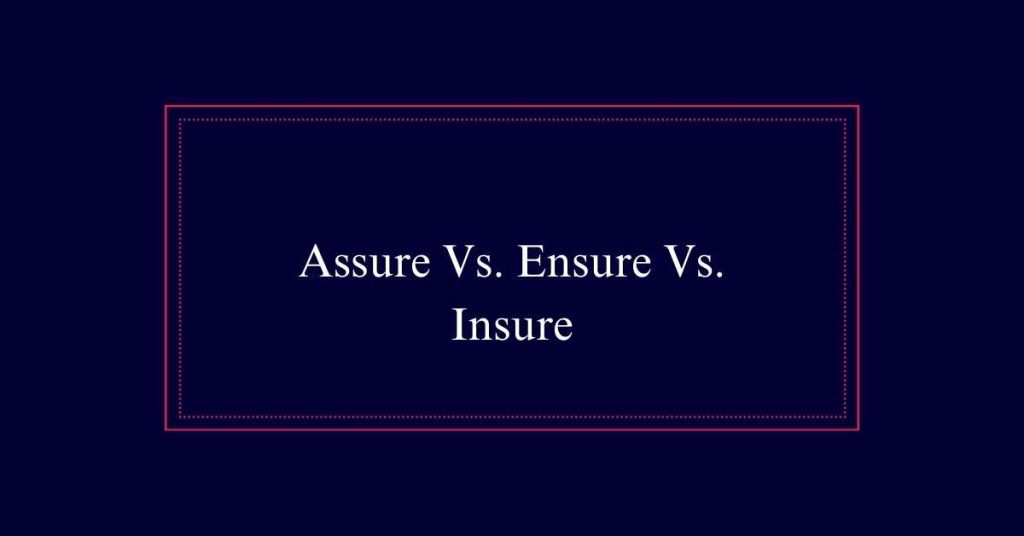Assure Vs. Ensure Vs. Insure
‘Assure’ means to provide confidence or eliminate doubts, usually in a personal context, like assuring someone of their safety. ‘Ensure’ involves taking steps to guarantee an outcome, such as ensuring all tasks are completed on time. ‘Insure’ refers to financial protection against potential losses, like insuring a vehicle.
While ‘assure’ is about removing uncertainties and reassurance, ‘ensure’ focuses on actions to secure results, and ‘insure’ deals with risk management through insurance policies.
Definition of Assure
The term ‘assure’ means to provide someone with confidence by removing their doubts. It involves communicating positively to make someone feel secure and confident. Assuring someone can be done through words or actions, aiming to eliminate uncertainties and provide peace of mind.
This term is often used to address emotional or psychological reassurance, whether it’s a person or an animal. For example, a manager might assure employees about job security during a period of organizational change. In the UK and Commonwealth countries, ‘assurance’ can also refer to a type of insurance that offers financial security.

When to Use Assure
Assure is used when you want to remove someone’s doubts and provide them with confidence. This term is often applied in interpersonal communications. For example, you might assure a colleague that a project is on schedule. The goal is to alleviate their concerns and instill trust.
It’s also common to use assure in customer service to enhance client satisfaction. When you assure someone, you are giving them a guarantee or certainty about a matter. This action can be verbal or written, and it aims to provide peace of mind.
In essence, to assure is to make someone feel secure and confident about a situation, eliminating any anxiety or uncertainty they may have.
Examples of Assure
To illustrate the use of ‘assure,’ consider these practical examples.
A manager might say, ‘I assure you that the project will be completed on time,’ to remove any team member’s doubts.
A doctor may assure a patient, ‘You will feel better soon,’ to provide comfort and confidence.
In customer service, a representative might say, ‘We assure you that your issue will be resolved promptly,’ to reassure the customer.
A parent might tell their child, ‘I assure you, there are no monsters under your bed,’ to alleviate fears.
In each case, ‘assure’ is used to provide certainty and peace of mind, ensuring the listener feels secure and confident about the situation.
Definition of Ensure
Guaranteeing something means taking steps to make sure it will happen. When you guarantee, you put measures in place to make sure an event or condition occurs. This involves creating conditions that leave no room for doubt.
For example, quality control processes guarantee products meet standards. The term ‘guarantee’ is often used in contexts where achieving a specific outcome is critical. It conveys a sense of responsibility and proactive action.
Guaranteeing can involve a range of actions, from simple checks to complex procedures. The key is that these actions are intentional and aimed at a definite result. By guaranteeing something, you eliminate uncertainties and secure the desired outcome.
When to Use Ensure
Use ‘vital’ when you need to make certain that a specific outcome will occur. This verb is ideal for situations where you are taking actions to guarantee a result. For instance, you might secure safety by following strict protocols or establish success by preparing thoroughly. It is often used in formal, professional, or technical contexts where certainty is crucial.
Unlike ‘assure,’ which involves providing confidence to a person, ‘secure’ focuses on the actions and measures taken to achieve a particular end. Therefore, use ‘vital’ to communicate steps or processes that aim to eliminate any uncertainty about the occurrence of an event or outcome.
Examples of Ensure
In various contexts, ‘guarantee’ is employed to describe actions taken to guarantee specific outcomes. For instance, project managers guarantee deadlines are met by closely monitoring progress. Teachers guarantee students understand material by providing additional resources and support.
Governments guarantee public safety by enacting and enforcing laws. Companies guarantee customer satisfaction by delivering high-quality products and services. Engineers guarantee structural integrity by conducting thorough inspections and maintenance.
Healthcare providers guarantee patient well-being by following strict protocols. In everyday life, parents guarantee their children’s safety by setting rules and boundaries.
Definition of Insure
Insure means to provide financial coverage or protection against potential losses through an insurance policy. This involves paying a premium to an insurance company. In return, the company agrees to compensate for specific types of damage or loss.
Insuring is common for valuable assets like homes, cars, and businesses. It can also cover health and life. The main purpose of insurance is to mitigate financial risk.
If an insured event occurs, such as an accident or natural disaster, the policyholder can file a claim. The insurance company then assesses the claim and provides the necessary financial support.
When to Use Insure
It’s important to use ‘insure’ when referring to the act of obtaining financial protection through an insurance policy. This term is specifically related to the coverage provided by insurance companies to guard against potential losses or damages.
For instance, you might secure your car, home, or health to receive compensation in case of accidents, theft, or illness. Businesses often protect their assets to mitigate risks associated with unforeseen events.
Using ‘insure’ correctly ensures clarity in communication, especially in contexts involving financial security and risk management. Remember, ‘insure’ pertains strictly to insurance policies and financial coverage, distinguishing it from ‘assure’ and ‘ensure,’ which serve different purposes in the English language.
Examples of Insure
Securing financial protection through insurance often involves insuring valuable assets like homes, cars, and businesses. For instance, when you insure your home against natural disasters, you gain financial security in case of damage. Car insurance is mandatory in many places, providing coverage for accidents and theft. Businesses often insure their operations to protect against property damage, liability, and income loss.
Here are some examples:
| Asset | Type of Insurance | Purpose |
|---|---|---|
| Home | Homeowners Insurance | Protects against damage or theft |
| Car | Auto Insurance | Covers accidents and theft |
| Business | Business Insurance | Safeguards operations and assets |
| Health | Health Insurance | Covers medical expenses |
| Life | Life Insurance | Provides for loved ones after death |
Key Differences
Understanding the key differences between ‘assure,’ ‘ensure,’ and ‘insure’ is essential for using these terms correctly.
‘Assure’ involves giving someone confidence or removing their doubts. For example, a manager might assure an employee that their job is secure.
‘Ensure’ means making certain that something happens. For instance, a team leader guarantees that a project meets its deadline by carefully planning.
‘Insure,’ on the other hand, refers to protecting against potential financial loss, typically through an insurance policy. A homeowner might insure their property against fire.
To conclude, ‘assure’ deals with confidence, ‘ensure’ with certainty of outcome, and ‘insure’ with financial protection. Understanding these distinctions helps in accurate and effective communication.







